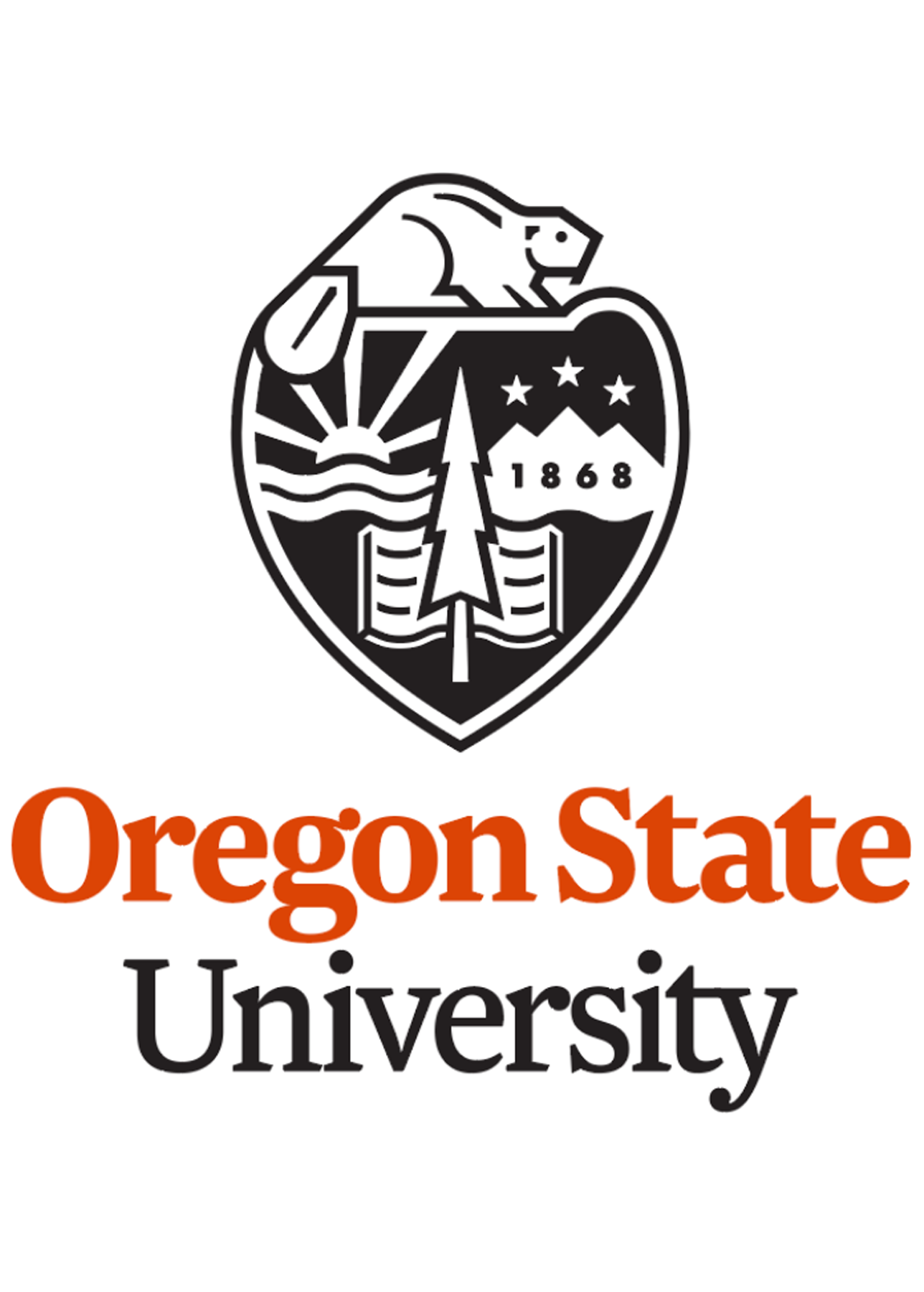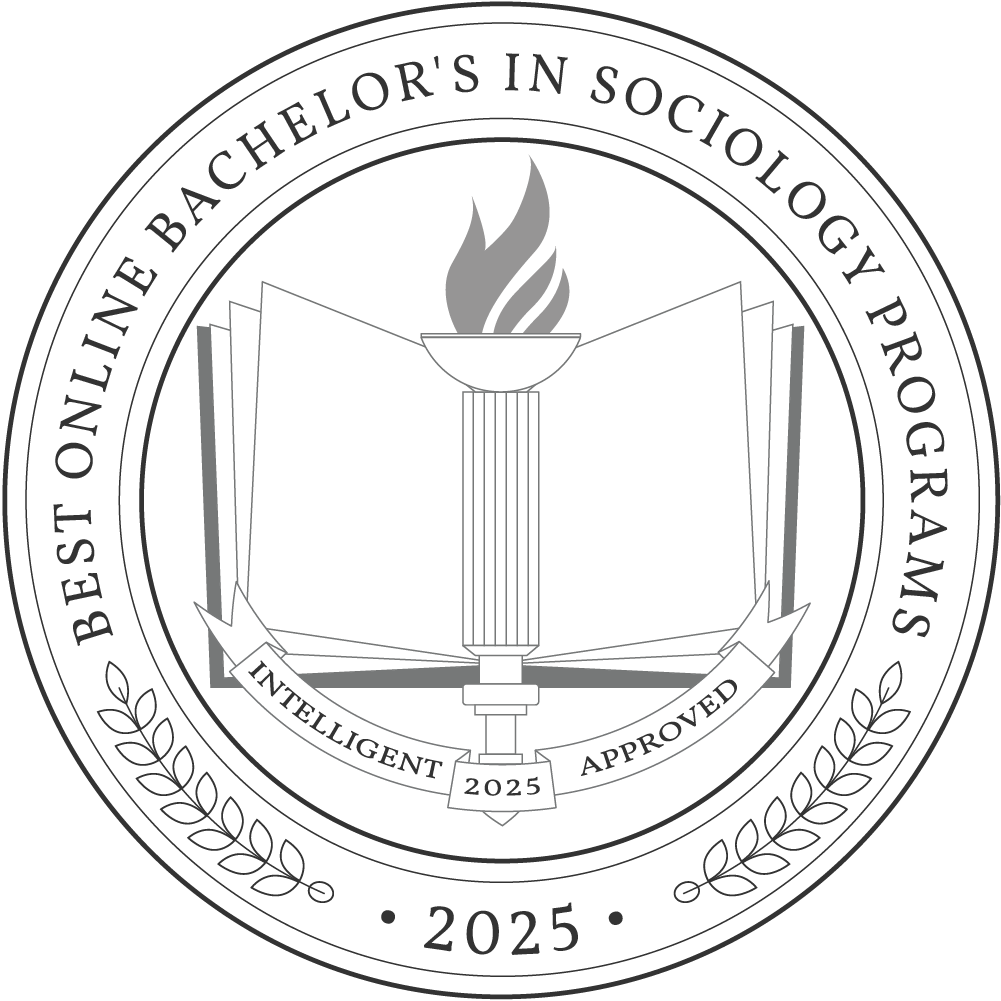Earning a bachelor’s in sociology can empower students with profound insights into human behavior, societal dynamics, and cultural intricacies. Graduates are well-prepared for fulfilling careers as:
- Social research analysts, with an annual median salary of $56,400
- Human resources specialists, with an annual median salary of $67,650
- Community outreach coordinators, with an annual median salary of $77,030
With the flexibility of online learning, students can complete their degrees in approximately four years while pursuing a relatively affordable education. On average, the tuition for an undergraduate degree is $14,688 per year. Whether you’re drawn to criminology, social services, or cultural analysis, these online programs will illuminate the path to your future career.
Why Trust Us
The Intelligent.com Higher Education Team is dedicated to providing students with independent, equitable school and program rankings and well-researched resources. Our expert-driven articles cover topics related to online colleges and programs, paying for school, and career outlooks. We use data from the U.S. Department of Education’s College Scorecard, the National Center for Education Statistics, and other reputable educational and professional organizations. Our academic advisory team reviews content and verifies accuracy throughout the year for the most current information. Partnerships do not influence rankings or editorial decisions.
- Analyzed over 2,000 national, accredited, and nonprofit colleges and universities
- 800+ rankings pages are reviewed and updated yearly
- Content is informed by reputable sources, surveys, and interviews with academic advisors and other experts
- Over 100 data points are reviewed for accuracy and quality throughout the year, including sources
How we rank schools
Our list features the best online Bachelor’s in Sociology degree programs at top colleges nationwide. Each school featured is a nonprofit, accredited institution — either public or private — with a high standard of academic quality for post-secondary institutions.
We evaluated each school’s program on tuition costs, admission, retention and graduation rates, faculty, reputation, and the student resources provided for online students. We collected data from trusted sources like the National Center for Education Statistics, individual school and program websites, school admissions counselors, and other data sources. Then, we calculated the Intelligent Score on a scale of 0 to 100 based on the following criterion:
Academic Quality:
- Admission rate versus enrollment rate
- Retention rate of students who return after year one
- Accreditation status (regional and programmatic)
- Nonprofit status, both private and public institutions
Graduation Rate
- Overall graduation rate
- Total number of currently enrolled students, including diversity metrics
- Student-to-faculty ratio
Cost and ROI
- In-state and out-of-state per-credit tuition rates and fees
- Required credits to graduate
- Earning potential after graduation
- Availability of federal student loans, scholarships, and other financial aid options
Student Resources
- Available student services for online-only and hybrid programs
- On-campus amenities like tutoring centers and the number of libraries
Read more about our ranking methodology.
Best 47 Accredited Online Bachelor’s in Sociology Programs
FiltersInstitution Type
Status
- Intelligent Score
- Alphabetically By University Name
- Acceptance Rate
- Enrollment
- In-state Graduate Tuition
- Out-of-state Graduate Tuition
- In-state Undergraduate Tuition
- Out-of-state Undergraduate Tuition

University of Florida
Intelligent Score: 99.63In-state: $4,477
Out-of-state: $25,694
In-state: $10,770
Out-of-state: $10,770
SAT: 1290-1460
ACT: 29-33
Resident: $112
Non-Resident: $500
Online
Southern Association of Colleges and Schools Commission on Colleges
120

University of Central Florida
Intelligent Score: 97.52In-state: $4,478
Out-of-state: $19,810
In-state: $6,916
Out-of-state: $6,916
SAT: 1160-1340
ACT: 25-30
Resident: $179
Non-Resident: $716
Online
Southern Association of Colleges and Schools Commission on Colleges
120

Florida International University
Intelligent Score: 97.04In-state: $4,721
Out-of-state: $16,529
In-state: $8,912
Out-of-state: $8,912
SAT: 1110-1260
ACT: 23-29
Resident: $236
Non-Resident: $649
Online
Southern Association of Colleges and Schools Commission on Colleges
120

Arizona State University
Intelligent Score: 96.43In-state: $10,710
Out-of-state: $28,800
In-state: $11,720
Out-of-state: $11,720
SAT: 1100-1320
ACT: 21-28
$574
Online
Higher Learning Commission
120

Fort Hays State University
Intelligent Score: 96.26In-state: $4,140
Out-of-state: $14,580
In-state: $3,726
Out-of-state: $3,726
SAT: N/A
ACT: N/A
$243
Online
Higher Learning Commission
120

University of Missouri
Intelligent Score: 93.26In-state: $9,330
Out-of-state: $27,612
In-state: $9,478
Out-of-state: $9,478
SAT: 1110-1320
ACT: 23-29
$542
Online
Higher Learning Commission
120

Kennesaw State University
Intelligent Score: 92.96In-state: $4,450
Out-of-state: $15,704
In-state: $5,328
Out-of-state: $5,328
SAT: 1030-1200
ACT: 19-25
$185
Online, On-Campus
Southern Association of Colleges and Schools Commission on Colleges
120

University of North Alabama
Intelligent Score: 92.38In-state: $9,600
Out-of-state: $19,200
In-state: $6,660
Out-of-state: $6,660
SAT: N/A
ACT: N/A
Resident: $340
Non-Resident: $680
Online, On-Campus
Southern Association of Colleges and Schools Commission on Colleges
120

Fayetteville State University
Intelligent Score: 89.91In-state: $2,982
Out-of-state: $14,590
In-state: $3,438
Out-of-state: $3,438
SAT: 840-1000
ACT: 16-20
In-State: $42
Out-of-State: $208
Online
Southern Association of Colleges and Schools Commission on Colleges
120

Tennessee State University
Intelligent Score: 89.52In-state: $7,854
Out-of-state: $20,574
In-state: $9,276
Out-of-state: $9,276
SAT: N/A
ACT: N/A
In-State: $291
Out-of-State: $836
Online
Southern Association of Colleges and Schools Commission on Colleges
120

Lamar University
Intelligent Score: 89.32In-state: $6,129
Out-of-state: $15,945
In-state: $6,397
Out-of-state: $6,397
SAT: 943-1140
ACT: 17-23
$314
Online
Southern Association of Colleges and Schools Commission on Colleges
120

Texas Tech University
Intelligent Score: 88.26In-state: $8,683
Out-of-state: $20,953
In-state: $6,788
Out-of-state: $6,788
SAT: 1070-1240
ACT: 22-27
Resident: $284
Non-Resident: $704
Online
Southern Association of Colleges and Schools Commission on Colleges
120

Oregon State University
Intelligent Score: 88.10In-state: $9,846
Out-of-state: $29,445
In-state: $13,257
Out-of-state: $13,257
SAT: 1080-1310
ACT: 21-29
$366
Online
Northwest Commission on Colleges and Universities
120

The University of Texas Permian Basin
Intelligent Score: 87.9In-state: $11,448
Out-of-state: $40,032
In-state: $12,028
Out-of-state: $12,028
SAT: 1210-1470
ACT: 26-33
$362
Online
Southern Association of Colleges and Schools Commission on Colleges
120

Charter Oak State College
Intelligent Score: 87.20In-state: $22,558
Out-of-state: $25,100
In-state: $17,457
Out-of-state: $17,457
SAT: Not Required
ACT: Not Required
$329
Online
New England Commission of Higher Education
120

Central Methodist University
Intelligent Score: 85.95In-state: $5,950
Out-of-state: $5,950
In-state: $6,075
Out-of-state: $6,075
SAT: N/A
ACT: N/A
$275
Online, On-Campus
Higher Learning Commission
120

University of North Carolina at Pembroke
Intelligent Score: 85.1In-state: $7,019
Out-of-state: $34,198
In-state: $10,552
Out-of-state: $10,552
SAT: 1280-1490
ACT: 28-33
In-State: $42
Out-of-State: $208
Online
Southern Association of Colleges and Schools Commission on Colleges
120

University of South Carolina
Intelligent Score: 84.57In-state: $12,288
Out-of-state: $33,528
In-state: $13,737
Out-of-state: $13,737
SAT: 1140-1340
ACT: 25-31
Resident: $433
Non-Resident: $869
Online
Southern Association of Colleges and Schools Commission on Colleges
120
How to Choose an Online Bachelor’s in Sociology Program
Choose your area of study
This degree may be offered as a Bachelor of Arts (focuses more on the humanities) or a Bachelor of Science (focuses more on research and data analysis). Also, many online bachelor’s in sociology programs will allow you to select a concentration and focus your studies on a particular niche in this field. If you already know what you would like to do after you graduate, look for programs that closely match these career goals. For example, criminology suits those drawn to law enforcement, medical sociology appeals to those interested in healthcare dynamics, and environmental sociology suits eco-conscious individuals.
Research schools and programs
You should only apply to institutions that have been approved by a DOE-recognized regional accrediting organization, such as the New England Commission of Higher Education or Northwest Commission on Colleges and Universities. These organizations evaluate schools to ensure they provide students with a high-quality education. Those who attend a school that isn’t regionally accredited may be unable to access financial aid or transfer credits to another institution if needed.
Also, you should look into whether programs offer services for online students such as tech support, mentorship, virtual tutoring, and career counseling.
To learn more about any schools that you’re interested in, you can visit the school’s website, contact an admissions counselor, follow the school on social media, or attend an in-person or virtual open house.
Prepare for tests and applications
Application requirements vary by school and program. High school transcripts are typically required, and you may also need to submit a personal statement, letters of recommendation, and standardized test scores. If testing is required, an ACT or SAT test prep course can help you get a good score and improve your odds of acceptance. Also, you should always contact an admissions counselor to ensure you have the most accurate information regarding program requirements and deadlines.
Select your program
Before making your final decision, review your needs and goals again. Do you plan to attend school full-time or part-time? Do you want your program to be as online as possible, or are you fine with a hybrid program that has a fair amount of in-person requirements? Some programs offer asynchronous courses, which can be completed at your own pace, while others only offer synchronous courses, which involve remotely attending lectures and completing assignments at the same time as other students — which of these two online learning formats do you prefer? Your school should accommodate your scheduling needs and learning preferences.
Determine how you’ll pay for your degree
Speak to financial aid counselors at the schools you’re interested in for the most accurate and specific information about program cost. Paying for your degree without incurring significant debt requires adopting a strategic approach.
First, explore scholarships and grants specific to your field of study, leveraging academic achievements and community involvement. Complete the FAFSA to unlock federal aid opportunities, including subsidized loans with favorable interest rates and repayment terms. Consider seeking a work-study program to gain experience while offsetting tuition costs. And those who already work in the field should see if their employer offers tuition assistance benefits.
What Can You Expect from an Online Bachelor’s in Sociology Program?
By earning your online bachelor’s in sociology, you will uncover the forces that shape behavior, relationships, and cultures while developing critical thinking and research skills. Throughout these programs, you’ll explore social inequality, gender dynamics, and global perspectives, gaining insights into societal structures.
This degree typically takes three to four years of full-time study, offering flexibility for working professionals or those balancing other responsibilities. While these programs are predominantly delivered online, some programs may allow students to participate in optional in-person workshops and residencies to enrich their learning further.
Potential courses you’ll take in an online bachelor’s in sociology program
- Social Inequality and Stratification: A standard core requirement, this course analyzes societal disparities based on race, class, and gender. Students will delve into the roots of inequality, its impact on individuals and communities, and strategies for addressing these issues through policy and activism.
- Gender and Society: Frequently considered an upper-division elective, this course examines the complex interplay between gender, culture, and societal norms. Examine how gender roles and expectations shape identities, relationships, and power dynamics while considering the intersectionality of gender with other social factors.
- Criminology and Deviance: Another elective, this course investigates the causes and consequences of criminal behavior and society’s response to deviant actions. Students will gain insights into the criminal justice system, theories of crime, and approaches to rehabilitation and punishment.
- Social Research Methods: A common core requirement, this course helps students develop essential research skills, including how to design and conduct surveys, interviews, and experiments. They will gain proficiency in analyzing and interpreting data to contribute evidence-based solutions for societal challenges.
What Can I Do With an Online Sociology Degree?
Career outlook
Understanding and addressing social issues is necessary for organizations within government, education, healthcare, and other industries. A bachelor’s degree in sociology offers career opportunities in many fields, and the growth for many of these jobs reflects the increasing focus on social and community issues on local and global scales.
Some of the most common jobs for workers with this degree include:
- Social and community service manager — Coordinate and oversee social programs. This role may involve collecting and analyzing data to demonstrate the impact of efforts on social and community development.
- Median annual salary: $77,030
- Projected employment growth (through 2032): 9%
- New jobs projected: 16,000 per year
- Probation officer or correctional treatment specialist — Assist criminal offenders through the rehabilitation process while they are on probation or parole.
- Median annual salary: $61,800
- Projected employment growth (through 2032): 3%
- New jobs projected: 7,400 per year
- Sociologist — These advanced researchers examine and analyze social institutions and cultures through observation, surveys, or other means. Their research measures qualitative and quantitative outcomes of social changes, such as new laws, which assists lawmakers, administrators, and other groups in making informed social strategies.
- Median annual salary: $101,770
- Projected employment growth (through 2032): 5%
- New jobs projected: 300 per year
Online Bachelor’s in Sociology Degree Frequently Asked Questions
How do I apply to an online bachelor’s in sociology degree program?
To apply for an online bachelor’s in sociology program, visit the school’s website and follow the application process. You must submit an online application form, transcripts, personal statement, and letters of recommendation. In addition, some programs may require standardized test scores or a minimum GPA. Connecting with an admissions counselor before applying is vital to understand specific requirements, deadlines, and any additional materials needed. Their guidance can enhance your application’s success and ensure a smooth process toward earning your sociology degree online.
How much does an online bachelor’s in sociology degree cost?
The average tuition for an undergraduate degree is $7,998 per year at public schools and $34,923 per year at private schools. In addition to tuition, you should also plan for extra costs such as technology fees and textbooks.
How long does it take to earn an online bachelor’s in sociology degree?
Generally, it takes around three to four years of full-time study, but the flexibility of most online programs can impact completion time. Students who enroll part-time usually take longer to complete degree requirements, which may benefit those balancing their education with other responsibilities.
The total number of required credits can also influence program length. Most undergraduate programs require 120 to 150 credits to graduate. Generally, the more credits required, the longer it will take to complete.
Is an online bachelor’s in sociology worth it?
A bachelor’s degree in sociology can help students compete for jobs where well-developed critical thinking, data analysis, and other skills are in high demand. Data from the Bureau of Labor Statistics shows that workers with a bachelor’s degree earn a median weekly salary of $1,493, compared to $899 for those with only a high school diploma.
These credentials can lead to even greater earning potential in the long term. Sociology undergraduate majors can use their credentials to pursue advanced programs, such as master’s or law programs, where they can develop their skills and knowledge for competitive and senior-level roles.
Compare School Options
Related Degrees
- English
- Social Work
- Environmental Science
- Social Studies
- Sociology
- Journalism
- Philosophy
- Creative Writing
- Anthropology
- Environmental Management

